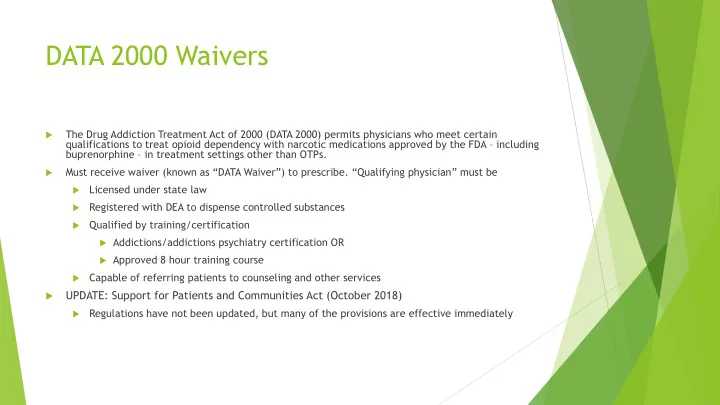

DATA 2000 Waivers The Drug Addiction Treatment Act of 2000 (DATA 2000) permits physicians who meet certain qualifications to treat opioid dependency with narcotic medications approved by the FDA – including buprenorphine – in treatment settings other than OTPs. Must receive waiver (known as “DATA Waiver”) to prescribe. “Qualifying physician” must be Licensed under state law Registered with DEA to dispense controlled substances Qualified by training/certification Addictions/addictions psychiatry certification OR Approved 8 hour training course Capable of referring patients to counseling and other services UPDATE: Support for Patients and Communities Act (October 2018) Regulations have not been updated, but many of the provisions are effective immediately
Nurse Practitioners/Physician’s Assistants Comprehensive Addiction and Recovery Act (CARA): NP and PA can also receive waivers UPDATE: clinical nurse specialists, certified registered nurse anesthetists, and certified nurse midwives, also eligible through October 1, 2023. NP and PA eligible permanently Must meet/maintain all state law requirements for prescribing and receive 24 hours of approved training Limit of 30 patients UPDATE: Now 100, effective IMMEDIATELY if working in Qualified Practice Setting Open question: Indiana requires collaborative arrangement with physician to review 5% of charts with a prescription. Does the collaborating physician also need waiver? (Probably, but nothing in the law)
“Qualified Practice Setting” Provides professional coverage for patient medical emergencies during hours when the practice is closed. Provides access to case management services for patients, including referral and follow-up services for programs that provide or financially support medical, behavioral, social, housing, employment, educational, or other related services. Uses health information technology if it is already required in the practice setting. Is registered for their state prescription drug monitoring program where operational and in accordance with federal and state law (INSPECT program) Accepts third-party payment for some services, though not necessarily for buprenorphine-related services and not necessarily all third-party payers Have adopted a “diversion control plan”
Patient Limits Old limit was 30 for first year, then apply to increase As far as I can tell, if there is no additional credentialing or qualified practice setting, limit is still 30 New law: If there is additional credentialing OR Qualified Practice Setting, then practitioner can have 100 Physicians can increase to 275 after one year at 100 Disclaimer: no opinion is offered as to the wisdom or practicality of this approach Increase to 275 requires one year at the lower limit, additional credentialing (certification in addiction medicine or addiction psychiatry) AND proof of a “Qualified Practice Setting” Increase to 275 is good for a three year period, must file to renew
Emergencies (“72 hour rule”) Non waivered practitioners can administer or dispense (but not prescribe) in hospitals (not limited to ED), if the following conditions are met: Patient must be admitted to a hospital for a primary medical problem other than opioid dependency Given to prevent opioid withdrawal that would complicate the primary medical problem Not more than one day’s medication may be administered or given to a patient at one time Treatment may not be carried out for more than 72 hours The 72-hour period cannot be renewed or extended
How to Apply/More information https://www.samhsa.gov/programs- campaigns/medication-assisted-treatment/training- materials-resources/buprenorphine-waiver HAS NOT BEEN UPDATED YET (as of 10/31/2018)
Recommend
More recommend